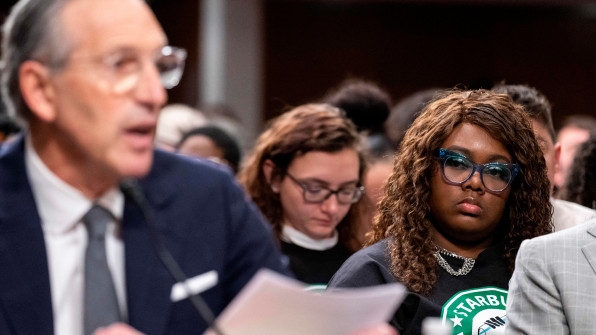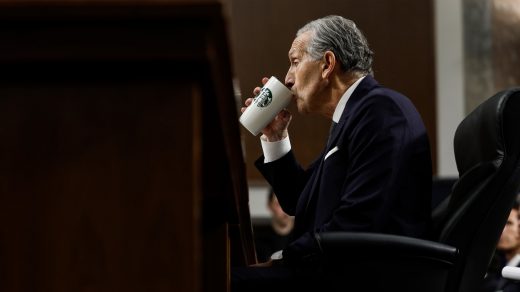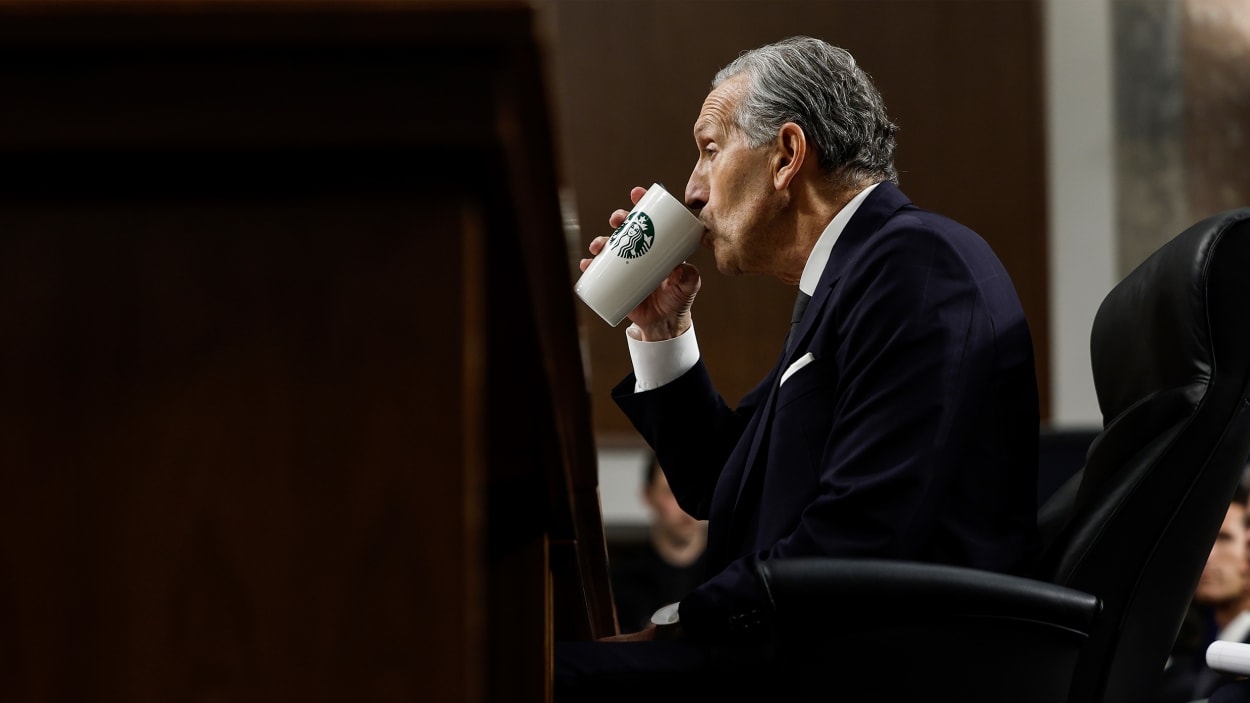Starbucks’ Howard Schultz goes to Washington to get roasted
By Kim Kelly
For those who care about workers’ rights and corporate misdeeds, the must-watch streaming event of 2023 had nothing to do with sports, or music, or even television—it was the March 29 grilling of Starbucks founder Howard Schultz, who was called to testify in front of the the Senate Health, Education, Labor, and Pensions Committee by committee chair Senator Bernie Sanders.
Once known primarily for his role as the architect of a Seattle-based coffee empire (and more recently, as a failed almost-presidential candidate and a potential Labor Secretary in a hypothetical Hillary Clinton administration), Schultz has spent the past two years morphing into one of labor’s most visible corporate boogeyman. Though Schultz recently stepped down as Starbucks CEO (for the second time), he has continued to be vocal about his opposition to the worker-led organizing wave that had led 289 Starbucks stores, and counting, to unionize. And that opposition has translated into company policy: As of March 27, the National Labor Relations Board (NLRB) has filed 83 complaints against Starbucks for violating federal labor law, and docketed 513 unfair labor practices against the company.
The coffee baron did not appear willingly. In February, he declined Sanders’ initial invitation to appear before the committee, and instead tried to send a substitute, former Capitol Hill staffer A.J. Jones II, and offered to send in two additional executives along with him. Sanders was unimpressed, and threatened to slap Schultz with a subpoena.
“The Senate HELP Committee invited Howard Schultz to testify, not a subordinate, because he is the man who engineered and continues to make labor decisions at Starbucks,” Sanders responded in a letter to Starbucks’ counsel. “At some point in the future, we may well want to hear from other executives as to how Starbucks intends to abide by the law and allow workers to form unions. But right now, the immediate issue is to hear from Mr. Schultz.”

Schultz caved, and arrived at the “No Company Is Above the Law: The Need to End Illegal Union Busting at Starbucks” hearing to defend his conduct and his business practices before Congress and a packed room full of pro-union Starbucks workers and other onlookers. The hearing also included rousing testimony from Maggie Carter, a Starbucks barista in Knoxville, Tennessee; and Jaysin Saxton, a disabled U.S. Coast Guard veteran and fired Starbucks worker leader from Augusta, Georgia; as well as from labor law expert Sharon Block and other witnesses. Sanders led the questioning, and was unequivocal in his disgust for the coffee CEO’s behavior. “Over the past 18 months, Starbucks has waged the most aggressive and illegal union-busting campaign in the modern history of our country,” he said in his opening statement.
“The Starbucks company did not break the law,” Schultz responded, contrary to the NLRB’s rulings, which are publicly accessible and have been widely reported upon. Schultz instead characterized the NLRB judge’s rulings as mere “allegations,” and noted his intention to legally challenge the remedies ordered. At various points, he was visibly frustrated, angry, and emotional at being confronted with the ugly truth of his own actions.
In one of the hearing’s more absurdist moments, Schultz—who is currently worth $3.7 billion—took issue with Sanders’ characterization as a “billionaire,” saying that it was “unfair” to depict his financial status accurately. “Yes, I have billions of dollars,” he admitted. “I earned it!” This statement was greeted by audible laughter from the workers in the audience.
When Sanders brought up the fact that the first store to unionize has been waiting for more than 460 days to reach a first contract, he asked Schultz if he would commit to exchanging proposals with the union “so that meaningful progress can be made to bargain a first contract in good faith.” The billionaire first responded by sniping at the NLRB and doubling down on Starbucks’ refusal to conduct negotiations virtually, and then grudgingly answered that they would “continue to negotiate in good faith” on a “single store basis.”
The company has insisted on bargaining store-by-store, resulting in about 90 bargaining sessions with its two unionized Buffalo-area stores since last October (the stores successfully unionized back in 2021). They have also refused to use Zoom during negotiations, a stance that Schultz doubled down upon later in the hearing. On March 24, Starbucks United workers in Seattle presented Starbucks’ lawyers with a set of proposals outlining their demands for wages, benefits, scheduling, and more; the same week, workers at over 100 stores in 40 different cities went on strike to call for higher pay and hammer the point home to the company’s new CEO, Laxman Narasimhan, that they were tired of being ignored.
During the hearing, Democratic senators beyond Sanders also took the gloves off. Senator Tina Smith of Minnesota questioned Shultz about how he could possibly say that he respects his employees when the company has established a history of denying benefits like credit-card tipping and wage increases to workers at unionized stores. Schultz offered that he was “under the impression it’s illegal to offer new benefits to the negotiating workers” as an excuse. “You’re a billionaire, and they are your employees,” Senator Smith told him. “The imbalance is extreme.”
The Republicans were much friendlier to the embattled billionaire than their pro-union Democratic counterparts, and proved to be much less interested in hearing the facts about Schultz’s union-busting conduct. At one point, Rand Paul quoted Ayn Rand, cheerleading the concept of capitalism, and complaining about how expensive Starbucks’ coffee is in a convoluted defense of the company’s money-making prowess. “The hearing today is convened to attack a private company for its success,” fumed the Kentucky senator.
It was fascinating to watch Paul and other conservatives tie themselves into knots to defend a man whose company has been found to have broken the law over 100 times—and whose generally progressive attitudes often make it the butt of Republican jokes. The irony did not escape Utah Senator Mitt Romney, who stated, “I recognize at the outset there’s some irony to a non-coffee-drinking Mormon conservative defending a Democratic candidate for president in perhaps one of the most liberal companies in America.” That did not stop them from trying, though.
Ultimately, the most important testimony today came from the workers themselves, Maggie Carter and Jaysin Saxton. They answered questions from Senator Sanders about scheduling, healthcare, and other workplace issues that they and thousands of other workers had organized around, sharing stories from their own lives as workers and as “partners”— Starbucks’ preferred nomenclature for its employees—that contrasted heavily with the utopian vision Schultz had labored to spin up.
“We saw that Starbucks had failed at honoring its stated mission values, so we chose to live up to them in challenging the status quo,” Saxton said. “We kept organizing despite increasing retaliation and surveillance.” He is not the only pro-union Starbucks worker to have been punished for his organizing efforts. As of today, the NLRB has ordered the reinstatement of 22 Starbucks workers who had been fired for union activity, including the Memphis Seven, and the union says it is waiting for the reinstatement of 130 others nationwide.
Thanks to the craven behavior of both Schultz and his newfound Republican allies, today’s hearing could have devolved into an absolute circus, but now as ever, it was the workers who showed what really matters.
“Workers will sometimes forgo healthcare instead of losing an entire paycheck,” Carter, who helped organize the South’s first unionized Starbucks, said at one point. “Howard Schultz is not a partner, to me. . . . You cannot be pro-partner and anti-union.”
Kim Kelly is an independent journalist, author, and organizer whose writing on labor, politics, class, and culture has appeared in Teen Vogue, Rolling Stone, The Nation, The New York Times, The Washington Post, Columbia Journalism Review, and many other publications. Her first book, Fight Like Hell: The Untold History of American Labor, is out now via One Signal/Simon & Schuster. She is currently working on her second book.
(18)



